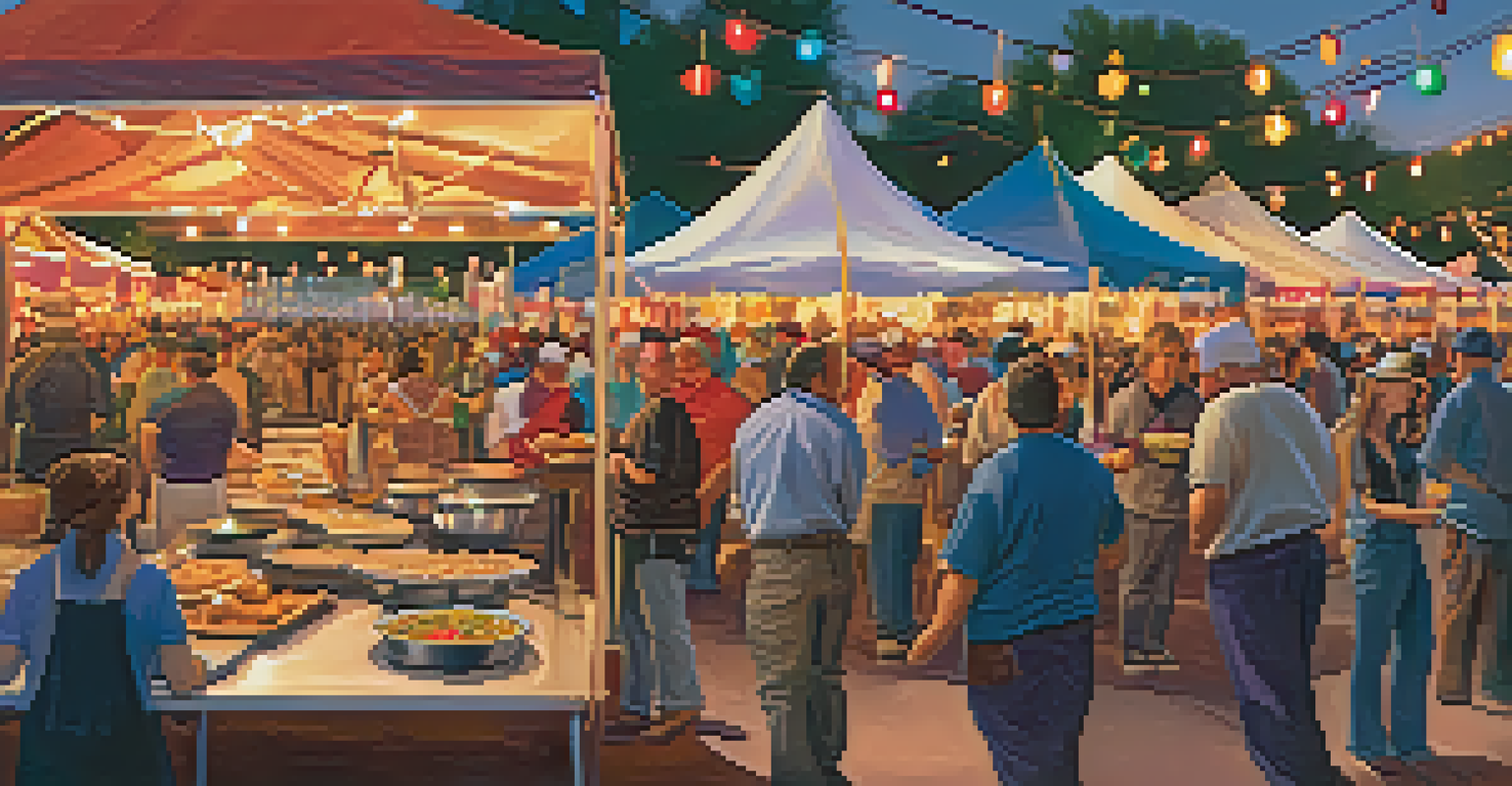The Role of Tucson in the Evolution of Southwestern Cuisine

Tucson: The Birthplace of Southwestern Cuisine
Tucson, Arizona, is often celebrated as a key player in the evolution of Southwestern cuisine. Nestled at the crossroads of Native American, Mexican, and Spanish influences, the city offers a unique culinary tapestry. This blend of cultures has contributed to a vibrant food scene that resonates with locals and visitors alike.
Food is the ingredient that binds us together.
One of the standout elements of Tucson's culinary identity is its commitment to using local ingredients. Farmers' markets and local farms thrive in the region, providing fresh produce that elevates traditional recipes. This emphasis on farm-to-table practices not only supports local economies but also enhances the overall dining experience.
As the first U.S. city to be designated a UNESCO City of Gastronomy, Tucson showcases its rich culinary heritage through festivals, restaurants, and community events. This recognition underscores the city's role in preserving and promoting Southwestern cuisine, making it a vital hub for food lovers.
The Influence of Indigenous Cultures
Indigenous cultures have played a pivotal role in shaping Tucson's culinary landscape. The traditions of the Tohono O'odham and other tribes have introduced unique ingredients and cooking techniques that continue to be celebrated today. For instance, the use of saguaro cactus and mesquite flour highlights how local resources can influence traditional dishes.

These indigenous practices emphasize sustainability and a deep respect for the land, which is integral to Southwestern cooking. By understanding and honoring these traditions, Tucson's chefs are able to create dishes that reflect the region's history. This connection to the past enriches the dining experience and fosters an appreciation for the ingredients.
Tucson: A Culinary Melting Pot
Tucson's unique blend of Native American, Mexican, and Spanish influences creates a vibrant culinary scene that celebrates diverse flavors.
Moreover, indigenous foodways encourage creativity in the kitchen, inspiring modern chefs to incorporate these elements into contemporary dishes. The result is an exciting fusion of old and new, drawing food enthusiasts eager to explore Tucson’s culinary evolution.
Mexican Heritage and Culinary Fusion
Tucson's proximity to the Mexican border has profoundly influenced its culinary scene. The merging of Mexican flavors with local ingredients has given rise to distinctive dishes that celebrate this rich heritage. Tacos, enchiladas, and tamales are just a few examples of how these two cultures blend beautifully.
Cooking is a way of keeping the traditions alive.
Notably, Tucson is also home to the Sonoran-style hot dog, a delicious testament to this fusion. Wrapped in bacon and topped with a variety of condiments, this local favorite showcases the creativity that arises from cultural intersections. Such dishes not only satisfy the palate but also tell a story of community and shared traditions.
This culinary fusion reflects a broader trend in Southwestern cuisine, where flavors are not confined by borders. Restaurants throughout Tucson proudly serve dishes that honor both Mexican and Southwestern roots, creating a vibrant dining landscape that invites exploration and enjoyment.
The Rise of Local Chefs and Restaurants
In recent years, Tucson has seen a surge of local chefs who are passionate about showcasing the region's culinary heritage. Many of these chefs prioritize seasonal and locally sourced ingredients, breathing new life into traditional recipes. This shift not only elevates the food but also fosters a sense of community among diners.
Restaurants like Café Poca Cosa and El Charro Café have become beloved institutions, known for their innovative takes on classic Southwestern dishes. These establishments highlight the importance of storytelling through food, as each dish often has a history that connects to Tucson’s diverse culture. Diners are not just enjoying a meal; they’re experiencing a piece of Tucson’s heart.
Local Ingredients Enhance Dining
The city's commitment to farm-to-table practices elevates traditional Southwestern recipes, fostering community support and sustainability.
Moreover, the emergence of pop-up dining experiences and food trucks has further enriched Tucson’s culinary diversity. These platforms allow chefs to experiment and share their unique interpretations of Southwestern cuisine, making it an exciting time for food lovers in the city.
Celebrating Tucson's Culinary Festivals
Tucson hosts a variety of culinary festivals that celebrate its rich food culture and heritage. Events like the Tucson Meet Yourself Festival and the annual Tamale Festival bring together food lovers to experience local flavors and traditions. These gatherings foster community spirit and encourage an appreciation for the region's culinary artistry.
During these festivals, attendees can sample an array of dishes, from traditional to contemporary, showcasing the versatility of Southwestern cuisine. Local chefs and food artisans often share their stories and techniques, making these events not just about food but also about connection and learning. It’s a wonderful opportunity for visitors to immerse themselves in Tucson's vibrant culinary scene.
Furthermore, these festivals often highlight the significance of sustainability and local sourcing, reinforcing Tucson's commitment to supporting its farmers and artisans. By celebrating its food culture in such a dynamic way, Tucson continues to inspire future generations of chefs and diners alike.
The Impact of Tourism on Tucson's Cuisine
Tourism has played a significant role in shaping Tucson’s culinary landscape, with visitors eager to explore the city's unique flavors. As more people flock to the region, local restaurants have adapted to meet the growing demand for authentic Southwestern cuisine. This influx of tourists has encouraged culinary innovation and experimentation, further enriching the food scene.
Many restaurants now offer tasting menus and curated experiences that allow diners to explore the depth of Tucson's culinary offerings. This not only showcases local ingredients but also introduces visitors to the stories behind each dish. By providing an immersive dining experience, these establishments create lasting memories that often lead to word-of-mouth recommendations.
Culinary Festivals Celebrate Heritage
Tucson's culinary festivals not only showcase local flavors but also promote community spirit and appreciation for the region's rich food culture.
Additionally, the tourism industry has prompted collaborations between chefs, farmers, and local producers. These partnerships focus on highlighting Tucson's agricultural bounty, ensuring that the city's culinary future remains rooted in its rich history while adapting to contemporary tastes.
The Future of Southwestern Cuisine in Tucson
As Tucson continues to grow and evolve, so does its contribution to Southwestern cuisine. The city's chefs are increasingly exploring global flavors while honoring local traditions, leading to exciting culinary fusions. This blend of innovation and respect for heritage ensures that Tucson remains a vibrant hub for food enthusiasts.
Moreover, the emphasis on sustainability and local sourcing is likely to shape the future of dining in Tucson. As more chefs commit to these practices, the culinary scene will continue to reflect a deep connection to the land and its resources. This not only enhances the flavors but also promotes a healthier relationship between food and the environment.

With the ongoing support of the community and a dedication to culinary excellence, Tucson is poised to remain a leader in the evolution of Southwestern cuisine. The city's dynamic food culture is a testament to its rich history and promising future, inviting all to experience its flavorful journey.